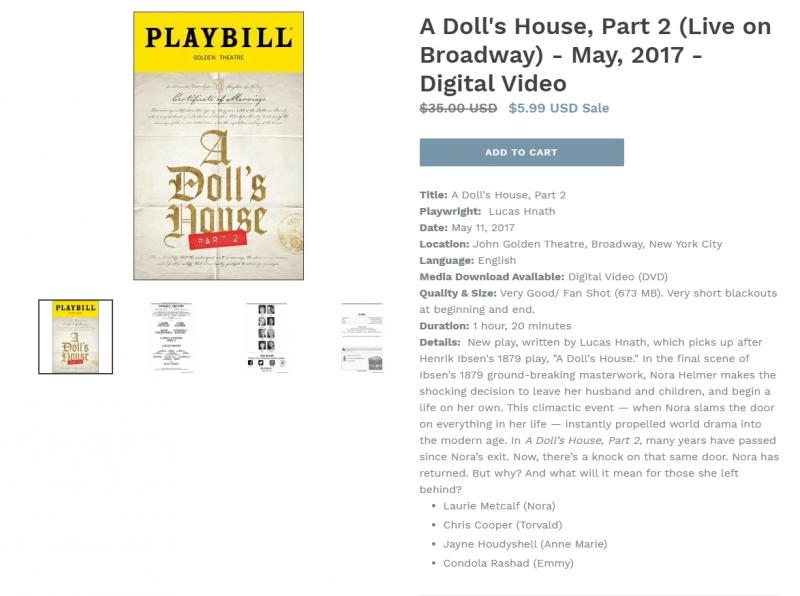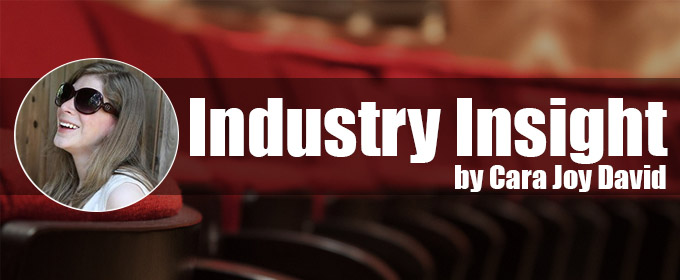Industry Editor Exclusive: Where Do Broadway Bootlegs Come From?
This fall, I began looking into the overt sale of Broadway bootlegs. There were, to my knowledge, a couple of well-known theater sites selling them and I contacted the owners of those sites. They both pointed me to the website of a self-proclaimed "international acclaimed non-profit" known as Iconic Arts. They had bought their bootlegs off of this site and simply resold them.
Iconic Arts as a site is basically a repository for videos for all the performing arts. The issue is most are seemingly filmed without artists' permission. Missed 9 TO 5 on Broadway and really want your Allison Janney musical fix? You can download a bootleg from there for as little as $5.99. Prices go up depending on quality and other factors. And this is not just for musicals -- there is a "fan shot" copy of A DOLL'S HOUSE, PART 2 and many other plays. You can even watch the two-part ANGELS IN AMERICA revival in your own home with popcorn for $19.98; the site claims the fan shot version is of "excellent" quality.
![]()
A representative from Iconic Arts said it is not the originators of this material. After I could not obtain the telephonic interview I requested, I was told over email: "We do not record (and have never recorded) any shows. Everything we have obtained through the years is readily available online and has been accrued from a variety of online sources. As I'm sure you're already aware, some examples of where recorded shows can be found online is: YouTube, Dailymotion, Tumblr, Discord, private mailing lists, online trading groups, commercial websites that sell the videos for actual pecuniary gain, and many many more."
I am aware of these sites and the material they contain. I am also aware the taping, disseminating and replicating of shows without permission violates the rules of many unions and also likely violates intellectual property law. Under US intellectual property law, you cannot just go taking, buying and/or selling an artists' work product. There is something called "fair use" of copyrighted material. According to the US Copyright Office, "fair use" is a "legal doctrine that promotes freedom of expression by permitting the unlicensed use of copyright-protected works in certain circumstances" such as for "criticism, comment, news reporting, teaching, scholarship, and research." This allows, for example, news shows to show a clip from a movie. That doesn't mean any use of a copyrighted work for criticism, comment, news reporting, teaching, etc. is fair use. It is not. Rather there is a four-factor balancing test used in evaluating questions of fair use. The factors are: "1) Purpose and character of the use, including whether the use is of a commercial nature or is for nonprofit educational purposes. 2) Nature of the copyrighted work. 3) Amount and substantiality of the portion used in relation to the copyrighted work as a whole. 4) Effect of the use upon the potential market for or value of the copyrighted work."
Iconic Arts claims that they are complying with copyright law and the site has a long "fair use" disclaimer. According to the site: "It is possible that this site may contain some copyrighted material, the use of which may not have always been specifically authorized by the copyright owner. We are making such material available in our efforts to preserve, promote, and support the Arts, and the material shall only be used for purposes such as criticism, comment, news reporting, teaching (including multiple copies for classroom use), scholarship, or research. This therefore constitutes a Fair Use (Fair Dealing) of any such copyrighted material as provided for in Title 17 U.S.C. Section 107 of the United States Copyright Law, as well as the applicable Statutes in all relevant International Law."

There is a problem with "this therefore constitutes Fair Use" -- it ignores the four-factor test. "I frequently advise clients that there is no 'brightline' rule when it comes to fair use," Adam J. Rosen, partner at the entertainment and media law firm Grubman Shire Meiselas & Sacks, P.C., wrote in an email. "Simply because an alleged infringer includes a disclaimer referencing some categories of uses that may be deemed to be fair use, this does not mean the defense will succeed. In the event of a copyright litigation, a court would apply the four-factor test to the facts at-hand and make its own determination."
So let's say take the sale of 9 TO 5. If a person downloads it purely for a story he is writing on Dolly Parton that doesn't necessarily mean that person (or Iconic Arts) is in the clear. According to Rosen, it depends on how a court would apply the four-factor test. This is the case whether or not Iconic Arts is a non-profit or whether or even whether or not the Dolly Parton story is for a non-profit publication.
"[E]ven if one factor of the fair use test seems likely to weigh in favor of an alleged infringer (e.g., if the use is genuinely and provably for nonprofit educational purposes), this is not necessarily dispositive and does not prevent the copyright holder(s) from filing copyright infringement claim(s)," Rosen explained. "[I]f the use is actually solely for bona fide non-profit educational purposes, this could potentially weigh in favor of a finding of fair use based on the first factor -- but that's not necessarily dispositive. For example, the third and fourth factors of the test -- 'the amount and substantiality of the portion taken' and 'the effect of the use upon the potential market' -- seem likely to favor the copyright holders. The alleged infringers in this scenario are using the entirety of the work and it's possible that the availability of these bootlegs could hurt the market for ticket sales to the show or the market for an audiovisual adaptation of the show (e.g., a 'live capture' or other film adaptation)."
Currently there are no running Broadway shows featured in the site's catalog, but there are fan shot videos of productions that are touring, being produced in other major markets and still being considered for film adaptations.
Iconic Arts does profess to be a non-profit with 501(c)(3) status. This, the cite claims, helps it to comply with the copyright law because it is not selling these videos for profit, the purchase prices are donations. (The site also takes other donations.) Except Iconic Arts is in fact not registered with the IRS.
When I began looking into this site in the fall, I was told I could get an interview with a representative of the site. I wanted them to explain their reasons for disseminating this information and whether they felt intellectual property laws were being violated by such dissemination. I also wanted to inquire about their other claimed charitable endeavors. The website claims: "Iconic works with schools, educators, artists, and local organizations from around the world to expand the reach of the Arts. From Music Sampling Days in inner-city schools to Master Classes for community organizations (and everything in between), we strive to bring the Arts to as many global citizens as possible." But searching for the name on the internet does not provide any proof of these efforts.
I never got my interview. I was told I could ask questions over email. Through that process, I was informed that Iconic Arts operates under an umbrella non-profit that has allegedly been established for 14 years. When I asked the name of that other organization, I received no response. (I refused to "donate" for the purposes of seeing the "official" tax receipt received in return for such donation.)
Iconic Arts has made one major change since my initial inquiry. When I first looked into it, the site was open to anyone. After my inquiries, it became open to "members only." That hasn't significantly limited dissemination of the material though. While it takes a free sign-up and a slight wait period to receive approval, everyone who tested it for me was approved.
Iconic Arts says it takes down copyrighted material when asked, but that does not mean it can go ahead knowingly distributing copyrighted material until the holder notices. This same thing holds for all of the other sites selling this material. It also applies to purchasers. There is civil and criminal liability associated with these acts.
"There is likely great risk to Icon[ic] Arts and its users by distributing and downloading these bootleg recordings," Rosen stated.
UPDATE: A few days after this post went up, Iconic Arts stated it would stop accepting members or providing fan shot material for resale. Iconic Arts did offer to point people to this material however. A statement on the website reads: "To pre-answer the two questions that we have received on hundreds of emails over the past few days, please note that we are no longer accepting any new members, and we are no longer providing access to any non-professional musical theatre or theatre performances whatsoever. We're very sorry for the inconvenience that causes to all those around the world who have no other way of experiencing said performances in any capacity. We hear you, and we know what a devastating development that is for you. As we transition our website to our new programme-specific site, you will notice that performances of all types will eventually be removed from the site and will no longer be offered. Our existing members will receive an email with additional information, but we encourage anyone with general questions, or those looking for information on where to obtain the aforementioned performances, to contact us at any time. Thank you so much for your unwavering support throughout the years."
Industry Classifieds
Videos

